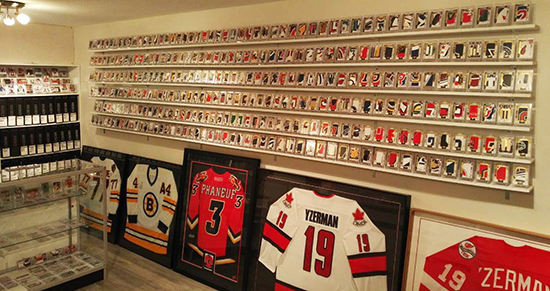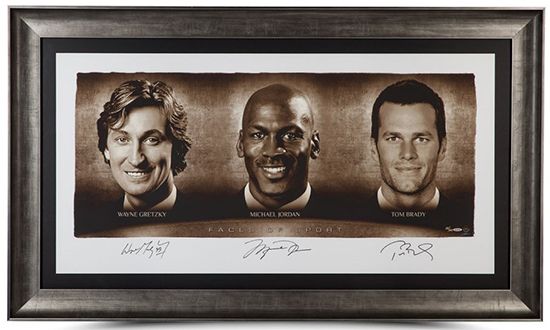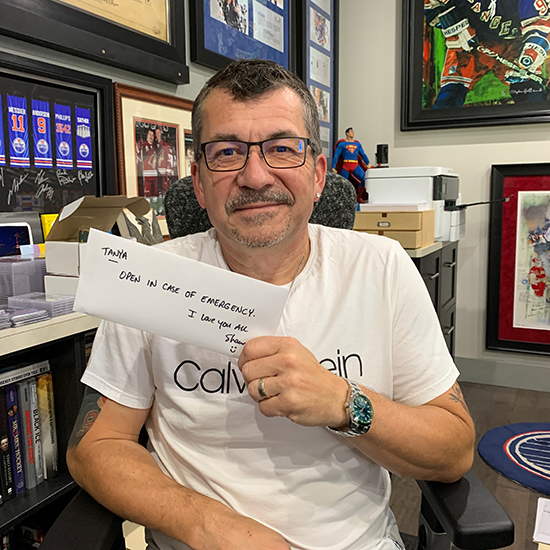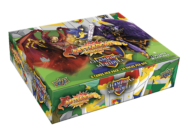During the COVID pandemic, while stuck at home sometimes I feel like I’ve watched Netflix. Not like part of Netflix, ALL of Netflix. So I’ve learned to seek my entertainment elsewhere. One night I was enjoying the webseries, “Sports Cards Live” and the guest shared a pearl of wisdom that I thought every collector should hear.
In Episode 25 of Sports Cards Live, Jeremy Lee interviews Shawn Chaulk who is a seasoned collector with a legendary collection. He shares stories about his incredible Wayne Gretzky collection and his thoughts on the market, but it was towards the tail end where my ears really perked up. Shawn keys on something that I think collectors who really dive into the hobby mess up on. I asked him if I could share his advice on the blog and he said, “Absolutely.”
If you have an extensive collection you need to think about succession planning. You’re not going to be here forever. Some collectors I’ve become close friends with have passed away unexpectedly, and they didn’t make plans regarding their collections. Often, collectors keep what they have so close to the vest and that makes sense as you don’t want to be robbed because you’ve acquired some nice things.
Shawn shared this advice regarding that:
“Typically when you’re a collector, and I think a lot of us can attest to this, in your household, you’re the only one who knows what you have. And in a lot of cases that’s because you don’t want your wife to know what you have. The point is, you end up having an awful lot of assets tied up in memorabilia and cards, and truly at the end of the day your wife and kids know you have a lot of stuff, but they don’t know where you got it, they don’t know what you paid, they definitely don’t know what to do heaven forbid you get hit by a bus or you pass away.
“So my opinion is, if you are not organized, and have not made a plan for that, you are really doing your family a disservice, because you could have $1,000,000 worth of cards in boxes and that’s all it is to them, a box of cards. They don’t know that you’ve secretly spent a good stash of money or it or maybe not secretly, but they probably don’t know what you’ve spent on it or what it’s worth today. So when something happens, they go to your hobby room and they see these boxes of stuff and they don’t know what to do with it.

When you amass a large collection, it’s hard for loved ones to know what to do with it in the event you pass away.
“So they have a garage sale and a savvy collector is out on a Saturday morning, he looks at it and his eyes bulge and he pays his $38 for the box of cards and sells them for $200,000. That’s what happens. So I firmly believe that every collector needs to have an active inventory of what they own.”
Having worked with collectors for over 20 years, I cannot tell you how often the above happens. It’s shocking how often this occurs and it could happen to you. Families are grieving and they could make tremendous mistakes during that. Again, I’ve seen it happen, heard the stories of families being fleeced and it just crushes me as I know their loved one wouldn’t have wanted to see it happen like this.
Shawn has a letter that shares details on his collection where his family can find it. It reads, “Open in case of…”
If you’re not doing anything of consequence right now, you may want to start one of those. Put it in your important documents file or have it added to your will.
Shawn goes on to share more good advice:
“It’s very important that somebody knows what to do with what you have when something happens to you, because it really could be seeing a big piece of your family’s net worth go down the drain, and that’s really not a fair situation. So I think it’s very important to know what you have and that somebody else can know what you have and how to deal with it.”
The host Jeremy goes on to suggest that collectors should have a few confidants in the hobby that their family can reach out to in the event of their passing. Friends who will keep the family clear of vultures that may be hovering, and I think that is very important. Most people don’t collect on an island, they have others they talk with and share with. Make sure you leave contact information for those in the hobby who you trust to help your family or loved ones in regards to how to handle your collection. I get that people have a private collection and many treat it like a vault, but you’ve got to let others in at some point as we cannot take our collectibles with us. We enjoy them today, but they will pass through our hands to another’s in time. Make sure that transition is as pain free for your family as possible.
I reached out to the attorney who did my trust to get his opinion on this matter since he is a bit of a collector as well. Jason Sheinberg is the founder of the Sheinberg Law Group and his practice is specific to trusts and estates. Here’s what he shared:

The Sheinberg Law Group works with families to make sure their estates are properly planned, and also with beneficiaries and fiduciaries to see to it that the estates are properly administered.
“I tell every person I meet with that they need to decide who gets the Tiger Woods Autographed Upper Deck Authenticated piece ahead of time before World War III breaks out amongst their kids after they pass away. When we create a will or a trust it will often say ‘all of my personal property assets’ will go to my kids. That is very vague, and there is no true division, it’s just left to the kids to fight it out. I cannot share with you all enough, DO NOT go this route.
“First off, you need to have Will or Living Trust so you can spell out who gets your estate in general, and in that Will or Trust you should spell out who gets your Upper Deck Griffey rookies and who gets Connor McDavid Cup Rookie Patch Autograph card. Otherwise it could be sheer pandemonium when the box of treasured cards comes out and you are not there to explain who gets what.

Attorney Jason Sheinberg has seen family infighting occur after a loved one passes and clear direction is not given about what is to be done with their collectibles.
“Losing a loved one is hard enough. Don’t make it harder for the kids by letting this conflict come to the surface. These sorts of the collectibles carry such a special meaning and you’d be surprised to know that people fight over collectibles as much as they fight over bank accounts. As estate planners we try to plan everything the best we can so your loved ones are not bickering over the most coveted card in the collection. Spell it out and be as specific as possible.
“Also, don’t just indicate who gets what, but for special items, spell out what you want them to do with it. ‘I want my triple signed Upper Deck Authenticated Photo to go to Jimmy and I want him to keep it to share with his children, it is not to be resold if at all possible.’ Other instructions may be, ‘I want my Ben Simmons Goodwin Champions Exquisite Autograph card to go to Billy and hopefully he can sell it to help out with college. Please talk to Uncle Steve about selling it as he knows the best way to do that.’ Spelling it out as to what you would like done with your collectibles will help resolve infighting that can occur should you pass unexpectedly.

Who wouldn’t fight over a piece like this? Make sure you spell out who will get your prized collectibles and what you expect them do do with it.
“The toughest part about my job is that I don’t have a crystal ball and often people put this on the back burner. Do yourself a favor and schedule a time to meet with someone to put together your will or trust. It’s never too early and you can make changes whenever you see fit. By planning for the future, it will allow you to enjoy today all that much more.”
















3 Comments
He Chris,
That is a great article with really valuable advice.
I have been meaning to type up some instructions regarding where to sell what and how much approx. it is worth and like Shawn said, to give the name and contact details of a couple of people who they can contact and get advice/support from regarding my collection.
I primarily collect and deal in high-end music memorabilia though I do have a collection of match worn soccer jerseys. Upper Deck has always had a place in my heart ever since I started collecting their World Cup 94 cards.
Anyway, I’m going off on a tangent. Thanks Shawn for that reminder and for sharing your expertise.
Laurence
Dublin
Ireland
Thanks for the comments Laurence. Always a pleasure to share with other collectors. Cheers
If you have a list that you use to insure your collection, that may be a great starting point. I’m including a column which lists specifically where each card/set/item is located as well.